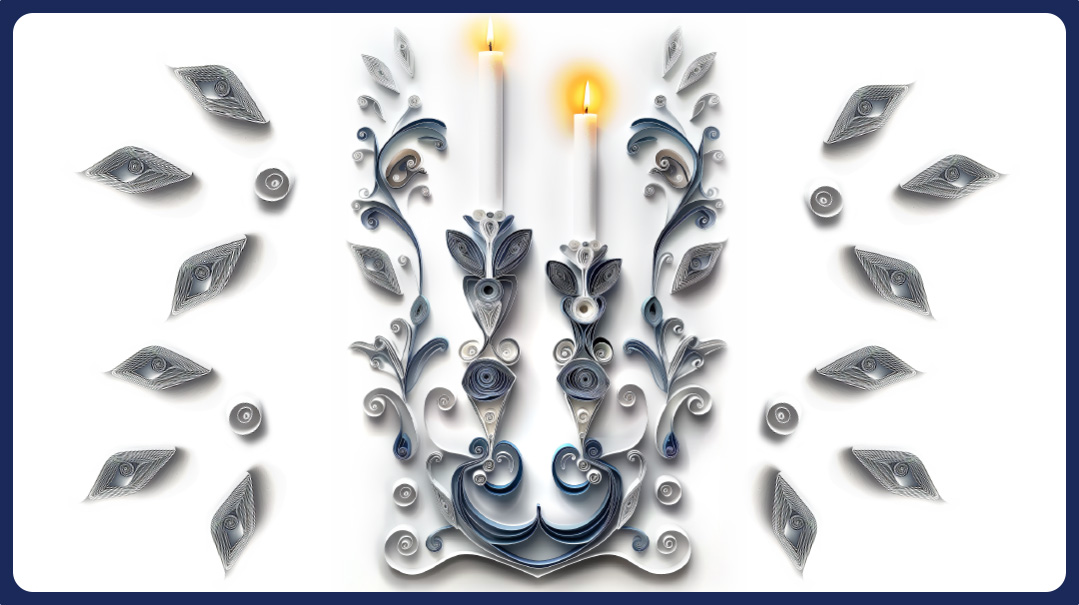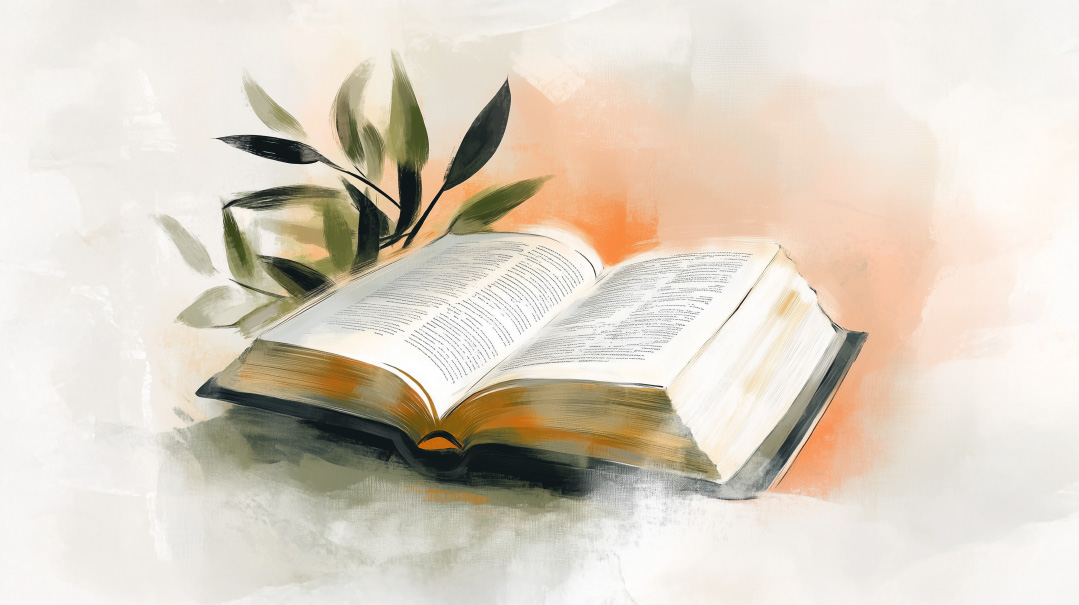Might of the Minuscule
| February 27, 2024Navigate life’s holes by refusing to fall into them

Might of the Minuscule
Stories that Uplift // Faigy Peritzman
MY
cherry tree is dead.
We’ve had a tumultous18-year-relationship, the two of us. I planted it because I grew up with a pink flowering cherry tree right outside my bedroom window, and I wanted to recapture those memories.
But my grown-up version of this cherry tree had a perverse independent streak. It blossomed with white flowers every year despite my explicit instructions. Furthermore, it got moody when it came to bearing actual cherries. Every five years or so it would grudgingly produce a batch of cherries that we harvested in glee, relishing the mitzvos of terumos and maasros. Then the tree would decide it had pampered us enough and go dormant for another half decade.
Still, the tree grew big and strong, several stories tall, extending glorious green shade over our garden.
This past spring, the tree seemed especially sensitive. It bloomed with its white flowers and then sprouted dozens of small green globes, destined to be a fine cherry crop.
Or so we thought. A week later, all those tiny cherries were somehow gone. It must have changed its mind about a harvest this year.
By summer, it was clear something was seriously wrong. Half the tree lost its leaves and the other half seemed droopy and dejected. We tried watering, hoeing, fertilizing, cajoling, and begging. But the tree refused to cooperate. By Elul, its branches were bare. I had a sinking sensation that this wasn’t a mere mood swing.
We called in the tree doctor. (Yes, a bona fide guy who specializes in healing trees.)
Standing at the trunk of the tree, he nodded sagely and gave the ominous verdict: “It’s gone. Eaten by beetles. Inside and out.”
Beetles? I stared at the branches, seeking those evil-looking critters with scaly backs and threatening antennas.
“Black beetles,” he clarified. “Each no larger than the size of a pinhead. Hordes of them have eaten your tree and you probably never even noticed them, because they’re each so small.”
“So… that’s it? There’s nothing to do about it?”
“Too late,” he intoned. “The beetles have done their work. It’s gone. You should chop it down quickly before they infest other trees in the neighborhood.”
How could they infest other trees if I couldn’t even see them? Peering closely, I thought I saw a dot moving. But then again, maybe not. How could something so small kill something so large?
My boys have chopped down the cherry tree. There’s a gaping hole where once was life. And I’ve learned to never underestimate the might of the minuscule. A soul can be sapped by the smallest of things. Each of those little critters may appear negligible, but their cumulative effect can topple a tree.
Like a Doughnut
In Search of Happiness // Rebbetzin Aviva Feiner
Rav Wolbe teaches us that the beginning and end of all of our life’s work is to acquire simchah. I like to call the happiness we work toward “sustainable happiness.”
The general worldview of happiness doesn’t jibe with the concept of “work.”
What do we need to do to achieve happiness?
Rav Shimon Schwab points out that happiness is a natural feeling. It’s present in babies from an early stage, and when babies aren’t happy, it’s usually a clue that something hurts them physically.
As we get older, our happiness fades when we look at what others have and wish we had it, too, beginning in toddlerhood when we want that toy or cookie, and morphing as we get older into wanting that shidduch, that job, that house, etc.
The wealthiest person in the world, says the Mishnah in Avos, is the sameach b’chelko, the person who is able to look into her own life and feel joy in what she has.
Rav Wolbe calls this the middah of histapkus — satisfaction. If we stop looking outward and focus on what we have, we’ll better enjoy life, our family, our home, our possessions — we’ll see all we have as the chelek Hashem gifted us with.
Choosing to have this attitude about life can be compared to the way we look at a doughnut. We can see the crispy dough, the sweet, colorful frosting, or the hole inside of it.
We all have holes in our lives. Our avodah is not to fall into those holes. We’re not proscribed from feeling sad. Sadness is real. On the roller coaster of life, there really are some truly frightening and challenging times that will sadden us. Our “work” is not to get stuck in the sadness, instead to feel it, and then look onward at the wonderful things we’ve been blessed with.
Too Busy to Notice
The Seventh Day // Rabbi Menachem Nissel
Once upon a time Reb Moshe MiSavran (1775–1837) spent Shabbos with his holy rebbe, Reb Baruch of Mezhibuzh. On Friday night, Reb Moshe noticed his rebbe overcome with emotion when saying Ribon Kol Ha’olamim, that beautiful tefillah said by the menfolk, lovingly tucked in-between Shalom Aleichem and Eishes Chayil.
If you don’t have the custom to say it, it may be familiar to you through the lyrics of Mordechai Ben David’s popular song, "Ana Melech." It first appeared in 1641, in Rav Yehuda Leib ben Dovid HaCohen’s classic sefer, Tikkunei Shabbos.
Reb Moshe MiSavran was shocked to notice the great tzaddik’s eyes filled with tears over one particular phrase: “I gratefully thank You, Hashem, my G-d and the G-d of my forefathers, for all the kindness You have done with me and which You will do with me (into the future).”
He approached his rebbe, wanting to understand why these words invoked so much regesh. Reb Baruch responded with an extraordinary insight: “I understand why Shabbos is a time to reflect on the past week and thank Hashem for all He has done for us. But I never understood the words ‘and which You will do with me (into the future).’ Why do we thank Hashem for things that haven’t happened? Tonight, I thought of an answer. So often during the week, we let life overwhelm us. We rush from place to place, with no time to breathe, with no headspace to see Hashem’s wonders and kindness. Shabbos comes in and the world comes to a grinding halt. Our souls are enveloped and nourished with kedushas Shabbos. We have tranquility and clarity. Now is the time to tell Hashem, “If at any moment over the next six days we don’t notice the miracles in our lives, we thank You now.”
This Shabbos, take a moment to reflect on the beauty and radiance of what you have. Feel hakaras hatov for all that Hashem has done for you — and for all that He will do for you that you may miss while being swamped with life.
Perhaps as the men at the table recite Ribon Kol Ha’olamim.
(Originally featured in Family First, Issue 883)
Oops! We could not locate your form.







